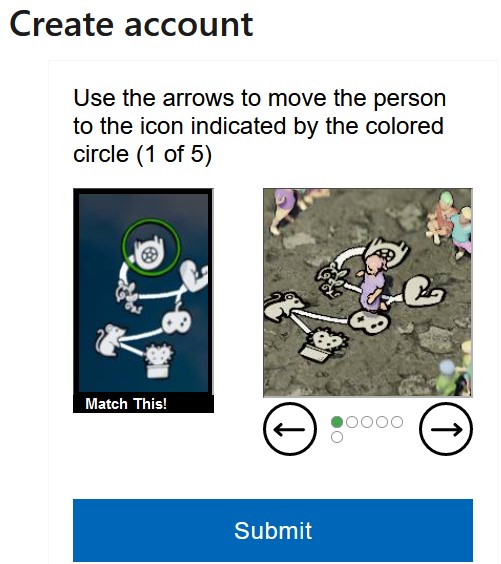
The test that Microsoft’s Outlook requires a human to complete in order to create an account.
By James Myers
There’s an interesting power we have granted to our computers, and that’s the power to determine if we are human. Doesn’t it seem ironic, that we have devolved to computers the power to determine if we are human?
The plague of imposters and criminals trying to hack our private accounts – which multiplies by the day – has necessitated complex tests to prevent bots, propagated by criminals, from accessing our data.
The Threats Multiply
Blackberry’s latest Global Threat Intelligence Report indicates that “From December 2022 to February 2023, we observed up to 12 attacks per minute, and the number of unique attacks using new malware samples skyrocketed by 50 percent—from one per minute in the previous report to 1.5 per minute during this reporting period.”
As the Covid-19 pandemic shifted many workers to home-based internet connections, and as the “Internet of Things” (IoT) continues to proliferate with refrigerators, barbecues, baby monitors, and home security cameras connected to the internet, the opportunities for criminals to invade our security continues to increase.
In the absence of national and global standards to regulate security for the applications promoted by so many sources, there are many risks. The risks can become deadly.
Kaspersky reports, “Ransomware made history in 2020 by contributing to the first reported death relating to a cyber-attack. In this incident, a hospital in Germany was locked out of its systems, leaving it unable to treat patients. A woman in need of urgent care was taken to a neighboring hospital 20 miles away but did not survive.”
The situation is clearly out of control. The threats are expanding exponentially, with an inadequate response. Why are we allowing this to happen?
Determining Who is Human and What is Not
When recently creating an e-mail account with Microsoft’s Outlook, I was confronted with the most challenging and frustrating Are-You-A-Human test yet.
The machine presented a shape with multiple curves, and then it rotated the shape and demanded that I use two arrow keys to move from one point to another point on the shape. It limited me to two keys only to move both up and down and side to side – four directions with two keys – which was a challenge. I didn’t apply my full brain power to the test (I have better things to do with my time) and so, after some trial and error, in five minutes I managed to move between the two points.
The machine responded with a green check mark, indicating I had passed the test.
But then it declared that “there’s something wrong,” and it presented me with another shape, rotated so that I could complete the test again.
I did as it demanded, at the expense of another five minutes of my time. Does the machine care about my time? Apparently not. For the machine, there is no limit to time.
My second test wasn’t good enough for the machine. Although I received another green check mark, my momentary satisfaction of human-ness subsided when the machine again reached a verdict that I had done something incorrectly. It didn’t indicate what my error was, but it insisted that I complete a third test.
Thank heavens I passed the third test, although I did nothing different from the previous two. I was awarded with an e-mail account, after FIFTEEN MINUTES SPENT to pass the machine’s test.
I felt like an idiot, and cursed the stupid machine at the same time.
At What Point is the Line Between Human and Machine Drawn?
Will there be a time when my bank decides I am not a human, and prohibits me from accessing my life’s savings?
Or will there come a time when an application necessary to my functions at work bars me from its use?
I am human. I always have been, and always will be. Why should I accept being subjected to a test by a machine?
Who programmed the machine to determine that I am a human? Who, or what, determines who a human is? What are the criteria?
Enough is enough.
It’s time that technology serve ordinary, law-abiding humans like me. The loopholes that allow criminals such free reign with technology must be fixed.
As it is, it will only become worse. It sure as heck isn’t going to get any better – is it?? Dream on.
Human technology should serve humans, not criminals. It’s time that we insist that laws and technological development respect this essential precept.
Our technological future depends on it. Humans must rule over machines, not the reverse.



